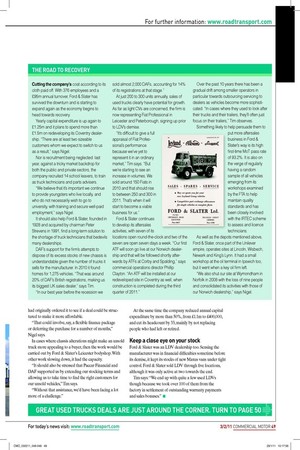THE ROAD TO RECOVERY
Page 43

If you've noticed an error in this article please click here to report it so we can fix it.
Cutting the company’s coat according to its cloth paid off. With 376 employees and a £95m annual turnover, Ford & Slater has survived the downturn and is starting to expand again as the economy begins to head towards recovery.
Yearly capital expenditure is up again to £1.25m and it plans to spend more than £1.5m on redeveloping its Coventry dealership. “There are at least two sizeable customers whom we expect to switch to us as a result,” says Nigel.
Nor is recruitment being neglected: last year, against a tricky market backdrop for both the public and private sectors, the company recruited 14 school leavers, to train as truck technicians and parts advisers.
“We believe that it’s important we continue to provide youngsters who live locally, and who do not necessarily wish to go to university, with training and secure well-paid employment,” says Nigel.
It should also help Ford & Slater, founded in 1928 and acquired by chairman Peter Strevens in 1991, find a long-term solution to the shortage of truck technicians that bedevils many dealerships.
DAF’s support for the firm’s attempts to dispose of its excess stocks of new chassis is understandable given the number of trucks it sells for the manufacturer. In 2010 it found homes for 1,275 vehicles. “That was around 20% of DAF’s British registrations, making us its biggest UK sales dealer,” says Tim.
“In our best year before the recession we sold almost 2,000 DAFs, accounting for 14% of its registrations at that stage.” At just 200 to 300 units annually, sales of used trucks clearly have potential for growth. As far as light CVs are concerned, the firm is now representing Fiat Professional in Leicester and Peterborough, signing up prior to LDV’s demise.
“It’s difficult to give a full appraisal of Fiat Professional’s performance because we’ve yet to represent it in an ordinary market,” Tim says. “But we’re starting to see an increase in volumes. We sold around 150 Fiats in 2010 and that should rise to between 250 and 300 in 2011. That’s when it will start to become a viable business for us.” Ford & Slater continues to develop its aftersales activities, with seven of its locations open round-the-clock and two of the seven are open seven days a week. “Our first ATF will soon go live at our Norwich dealership and that will be followed shortly afterwards by ATFs at Corby and Spalding,” says commercial operations director Phillip Clayton. “An ATF will be installed at our redeveloped site in Coventry as well, when construction is completed during the third quarter of 2011.” Over the past 10 years there has been a gradual drift among smaller operators in particular towards outsourcing servicing to dealers as vehicles become more sophisticated. “In cases where they used to look after their trucks and their trailers, they’ll often just focus on their trailers,” Tim observes.
Something likely to help persuade them to put more aftersales business in Ford & Slater’s way is its high first-time MoT pass rate of 93.2%. It is also on the verge of regularly having a random sample of all vehicles emerging from its workshops examined by the FTA to help maintain quality standards and has been closely involved with the IRTEC scheme to assess and licence technicians.
As well as the depots mentioned above, Ford & Slater, once part of the Unilever empire, operates sites at Lincoln, Wisbech, Newark and King’s Lynn. It had a small workshop at the oil terminal in Ipswich too, but it went when a key oil firm left.
“We also shut our site at Wymondham in Norfolk in 2008 with the loss of nine people and consolidated its activities with those of our Norwich dealership,” says Nigel.













































